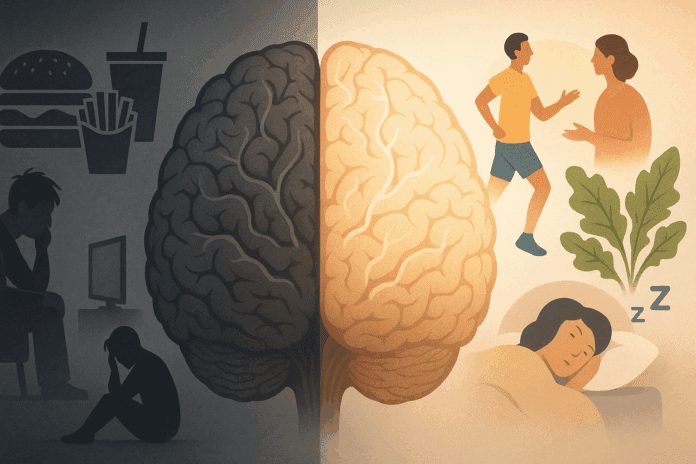Dementia is not a single disease, but rather a clinical syndrome that describes a significant decline in cognitive function—affecting memory, reasoning, communication, and daily functioning. It is one of the most pressing global public health challenges, with millions of individuals and families affected worldwide. Although age remains the most significant risk factor, emerging evidence suggests that many aspects of daily behavior may either slow down or accelerate the progression of cognitive decline. This realization has prompted researchers, physicians, and public health advocates to ask a crucial question: what are the 7 habits to avoid dementia, and how do our everyday actions impact the aging brain?
The idea that lifestyle choices—those seemingly minor daily decisions—can shape the trajectory of our cognitive future is both empowering and alarming. On the one hand, it implies that we hold greater influence over brain health than once believed. On the other hand, it reveals that some of our routine behaviors may be quietly eroding our mental clarity over time. Understanding what habits accelerate dementia allows us to intervene early, reverse course where possible, and support long-term brain resilience.
In this article, we’ll explore seven scientifically supported habits that may contribute to cognitive decline if practiced regularly. By delving into each one with depth and nuance, we aim to shed light on how these behaviors subtly influence brain function—and what you can do to protect your cognitive well-being in the long run.
You may also like: How to Prevent Dementia and Alzheimer’s Disease Naturally: Expert-Backed Strategies to Reduce Your Risk Through Lifestyle and Diet

Neglecting Physical Activity and Leading a Sedentary Lifestyle
Regular physical movement isn’t just important for cardiovascular and metabolic health—it also has profound implications for the brain. A sedentary lifestyle has been associated with structural changes in the brain, including reduced hippocampal volume, which plays a critical role in memory formation and spatial navigation. Numerous longitudinal studies have linked inactivity with a higher risk of developing dementia, particularly Alzheimer’s disease.
When considering what habits accelerate dementia, physical inactivity stands out as one of the most modifiable and well-studied contributors. Exercise promotes neurogenesis—the growth of new neurons—and enhances synaptic plasticity, which is essential for learning and memory. It also increases cerebral blood flow, delivering vital oxygen and nutrients to brain cells while removing metabolic waste. Furthermore, physical activity stimulates the release of brain-derived neurotrophic factor (BDNF), a protein crucial for brain cell survival.
In contrast, chronic inactivity can contribute to insulin resistance, systemic inflammation, and cardiovascular problems, all of which are known risk factors for dementia. Individuals who spend the majority of their day sitting—whether at a desk, in front of a television, or in the car—may unknowingly be creating an environment ripe for cognitive deterioration. Even light activity such as walking, stretching, or gardening has been shown to support brain health. Avoiding this daily habit of passivity is one of the most important ways to reduce dementia risk.

Chronic Sleep Deprivation and Disrupted Sleep Patterns
Sleep is not simply a time for rest—it is an active, restorative process that plays a vital role in maintaining cognitive function. During deep sleep, the brain undergoes a kind of “housekeeping” process, in which toxic proteins such as beta-amyloid and tau are cleared through the glymphatic system. These same proteins, when allowed to accumulate, are hallmarks of Alzheimer’s pathology.
Poor sleep hygiene, irregular sleep schedules, and chronic insomnia have all been associated with accelerated cognitive decline in older adults. Several large-scale population studies have identified strong correlations between sleep duration and dementia risk, particularly when individuals consistently get less than six hours of sleep per night. But it’s not only about quantity—quality of sleep is equally crucial. Sleep fragmentation, obstructive sleep apnea, and restless leg syndrome may interrupt the deep, slow-wave sleep needed for brain repair.
Understanding what habits accelerate dementia must include a close look at nightly routines. Excessive exposure to blue light before bed, high caffeine intake in the afternoon, or working late into the night can all impair sleep quality. Over time, the cumulative effects of disrupted sleep can diminish mental clarity, impair memory consolidation, and set the stage for neurodegeneration. Cultivating healthy sleep patterns by maintaining a consistent bedtime, limiting screen time before bed, and managing sleep disorders is a fundamental strategy for preserving cognitive health.

Poor Dietary Choices and Nutritional Deficiencies
Nutrition is an often-overlooked pillar of brain health. Diets high in processed foods, refined sugars, and unhealthy fats can contribute to systemic inflammation, insulin resistance, and vascular dysfunction—all of which negatively affect the brain. Many individuals ask, “What are the 7 habits to avoid dementia?”—and a diet devoid of nutrient-dense, whole foods is near the top of the list.
Diets rich in antioxidants, omega-3 fatty acids, fiber, vitamins (particularly B-complex vitamins), and polyphenols have been associated with reduced risk of cognitive decline. These nutrients combat oxidative stress, support neurotransmitter synthesis, and reduce the formation of neurotoxic plaques. Conversely, a Western-style diet, characterized by high levels of sodium, trans fats, and added sugars, has been linked to faster cognitive aging and impaired memory performance.
Emerging research suggests that even short-term exposure to unhealthy dietary patterns can negatively impact brain function, affecting concentration and decision-making. Long-term adherence, however, may cause more permanent structural changes. Inflammation in the gut, often triggered by poor diet, can lead to neuroinflammation due to the gut-brain axis—an intricate communication network that links intestinal and mental health. Individuals seeking to avoid cognitive decline should emphasize brain-supportive diets such as the Mediterranean or MIND diets, which are rich in leafy greens, berries, nuts, olive oil, and fatty fish.

Chronic Stress and Inadequate Stress Management
Stress is a normal biological response to challenging situations, but when it becomes chronic and unmanaged, it poses a serious threat to mental health. The brain, particularly the hippocampus and prefrontal cortex, is highly sensitive to elevated levels of cortisol—the stress hormone. Sustained exposure to high cortisol can lead to neuronal damage, shrinkage of brain structures involved in memory, and reduced neuroplasticity.
When assessing what habits accelerate dementia, chronic stress is one that often flies under the radar. Unlike diet or exercise, stress may not always manifest in outward behavior. However, the internal toll it takes is significant. Individuals experiencing prolonged stress often report “brain fog,” poor concentration, and memory lapses—symptoms that may precede more serious cognitive impairment. Over time, chronic stress may hasten the aging of brain tissue, reduce resilience to neurological insults, and impair emotional regulation.
Moreover, stress often coexists with other dementia-accelerating habits such as sleep disturbances, poor eating choices, social isolation, and sedentary behavior. It can also contribute to mental health conditions like anxiety and depression, both of which are independent risk factors for cognitive decline. Developing a toolkit for managing stress—such as mindfulness meditation, yoga, deep breathing exercises, time in nature, or cognitive behavioral therapy—is essential for protecting brain health and maintaining mental clarity.

Social Isolation and Lack of Cognitive Engagement
Human beings are inherently social creatures, and the brain thrives on meaningful interaction. Social isolation, loneliness, and lack of cognitive stimulation have all been independently linked to an increased risk of dementia. People who engage regularly in conversations, participate in group activities, and maintain strong social networks tend to have sharper cognitive faculties and slower rates of cognitive decline.
It’s not just about being physically present with others—it’s about mentally engaging with them. Emotional exchanges, problem-solving conversations, and shared experiences activate various brain regions responsible for memory, language, and executive function. The absence of these interactions can lead to cognitive atrophy, much like a muscle that weakens without use. For those wondering what habits accelerate dementia, prolonged social withdrawal and disengagement from mental challenges rank among the most harmful.
Moreover, cognitive inactivity—failing to challenge the brain through reading, puzzles, games, or learning new skills—may contribute to the deterioration of neural pathways. The brain is plastic, meaning it can adapt and reorganize itself, but it requires stimulation to do so. Activities that demand focus, reasoning, creativity, and memory reinforce synaptic connections and build cognitive reserve, which helps buffer against age-related decline.
In today’s digital age, genuine social interaction is increasingly being replaced by passive screen time, which offers little cognitive reward. Cultivating intellectually and emotionally rich social experiences—whether through community volunteering, book clubs, or simply calling a friend—can help counteract the risk associated with isolation and mental inactivity.
Excessive Alcohol Use and Substance Abuse
Alcohol’s effect on the brain is dose-dependent. While some studies suggest that light to moderate drinking may have limited protective effects in certain populations, excessive or chronic alcohol use is unequivocally detrimental to cognitive health. Alcohol is neurotoxic, especially in high quantities, and can damage the cerebral cortex and hippocampus, impairing memory, decision-making, and emotional regulation.
Substance abuse of any kind—whether involving prescription medications, illicit drugs, or over-the-counter substances—can compromise brain health by altering neurotransmitter levels, reducing oxygen delivery, and increasing oxidative stress. Individuals with alcohol use disorder or histories of substance misuse are at elevated risk for alcohol-related dementia and other neurodegenerative conditions. Even in younger adults, excessive substance use can lead to cognitive impairments that may persist long after abstinence.
When discussing what habits accelerate dementia, alcohol misuse must be part of the conversation. Its role in promoting systemic inflammation, disrupting sleep, impairing liver function, and increasing cardiovascular risk all converge to damage brain integrity. In addition, excessive alcohol consumption often displaces healthier habits like exercise, proper nutrition, and restorative sleep, compounding its harmful effects.
Addressing this issue requires both awareness and action. For those who drink, setting limits and monitoring consumption is critical. For others, seeking professional support for substance-related challenges can significantly reduce long-term cognitive risks. Abstaining or moderating intake is an actionable way to protect brain function and avoid compounding existing vulnerabilities.

Smoking and Exposure to Environmental Toxins
Tobacco use remains a leading cause of preventable illness and death worldwide, and its negative impact on brain health is substantial. Smoking constricts blood vessels, reduces oxygen supply, and accelerates atherosclerosis—all of which impair cerebral blood flow. Studies have consistently shown that smokers have a significantly higher risk of developing dementia, particularly vascular dementia, due to the cumulative vascular damage caused by nicotine and other toxic chemicals.
Environmental toxins—such as air pollution, pesticides, heavy metals, and industrial chemicals—also play an underappreciated role in cognitive aging. Long-term exposure to fine particulate matter (PM2.5), for instance, has been linked to increased risk of Alzheimer’s and other neurodegenerative diseases. These toxins can cross the blood-brain barrier, induce oxidative stress, trigger neuroinflammation, and even damage DNA within neurons.
Understanding what habits accelerate dementia requires us to look beyond individual behavior and consider environmental context. Smoking is not only dangerous on its own—it often increases vulnerability to other toxic exposures. Furthermore, individuals living in areas with poor air quality or working in high-exposure industries may face compounded risks unless protective measures are taken.
Quitting smoking remains one of the most powerful interventions for preserving both cardiovascular and cognitive health. Likewise, reducing exposure to environmental toxins—by using air purifiers, eating organic when possible, and minimizing contact with household chemicals—can support brain longevity. While we cannot control every environmental factor, awareness and proactive choices can mitigate the risks.

Breaking the Cycle: Replacing Risky Habits with Brain-Healthy Practices
Now that we have explored what habits accelerate dementia, it becomes clear that the path to cognitive resilience lies in daily intention. These habits—though seemingly ordinary—interact in complex ways to either protect or harm the brain. Addressing one factor may provide benefit, but addressing several simultaneously creates a compounding effect that significantly enhances brain health over time.
Replacing sedentary behavior with daily movement, prioritizing restorative sleep, adopting a brain-nourishing diet, managing stress proactively, nurturing social connections, avoiding harmful substances, and reducing toxic exposure are all powerful steps. Importantly, these actions not only reduce dementia risk but also enhance quality of life, mood, energy, and overall well-being. For those wondering what are the 7 habits to avoid dementia, the answer lies not in dramatic overhauls but in consistent, thoughtful adjustments to how we live each day.
Health literacy also plays a crucial role. Being informed empowers individuals to make decisions rooted in science rather than myth. Conversations with healthcare providers, regular cognitive assessments, and staying updated on evolving research can further strengthen one’s ability to guard against decline. Prevention is most effective when it is proactive, and even small changes—when implemented consistently—can make a meaningful difference.
Frequently Asked Questions (FAQ): 7 Daily Habits That May Accelerate Dementia
1. How early in life should you start avoiding dementia-related habits?
Many people believe dementia prevention begins in old age, but the truth is that early adulthood and even adolescence are critical periods for forming brain-protective behaviors. The brain builds cognitive reserve—its resilience to aging and damage—through decades of healthy lifestyle habits. This means understanding what habits accelerate dementia in your 20s or 30s can have profound long-term effects. For instance, chronic sleep deprivation or a consistently sedentary lifestyle in youth can lay the groundwork for inflammation and neural inefficiency decades later. Addressing what are the 7 habits to avoid dementia early in life offers the brain a stronger foundation to resist cognitive decline.
2. Are certain professions more likely to encourage habits that accelerate dementia?
Yes, some careers—especially those involving high stress, long hours of sedentary desk work, and limited social interaction—may inadvertently reinforce what habits accelerate dementia. Office-based professions that offer little opportunity for physical movement, creativity, or downtime can erode both physical and cognitive health over time. Professions with rotating night shifts may also disturb circadian rhythms and sleep quality, another significant factor. Conversely, jobs that combine cognitive challenge, physical activity, and interpersonal engagement tend to support long-term brain vitality. Individuals in high-risk occupations should be particularly mindful of what are the 7 habits to avoid dementia and proactively integrate protective behaviors into their routines.
3. Can technology use be one of the habits that accelerates dementia?
While technology in moderation can enhance cognitive engagement, excessive or passive screen time may qualify among what habits accelerate dementia, particularly when it displaces real-world interaction and physical activity. Digital multitasking can fragment attention and limit deep thinking, which are vital processes for long-term memory and brain connectivity. Overreliance on apps or GPS for routine decisions may also reduce opportunities for spatial reasoning and problem-solving. Understanding what are the 7 habits to avoid dementia includes evaluating how tech habits impact sleep, stress levels, and social behavior. To counterbalance, technology can also be harnessed positively—such as with brain-training apps or virtual social groups—when used intentionally.
4. Is there a connection between oral health and dementia-related habits?
Emerging research has begun to link poor oral hygiene with an increased risk of cognitive decline, suggesting that neglecting dental care may be among the lesser-known habits that accelerate dementia. Chronic gum inflammation caused by periodontal disease may introduce harmful bacteria into the bloodstream, potentially affecting the brain. This biological cascade may exacerbate neuroinflammation—a contributing factor in Alzheimer’s pathology. People often overlook dental hygiene when considering what are the 7 habits to avoid dementia, but regular brushing, flossing, and dental checkups may offer cognitive protection. It’s another example of how seemingly unrelated daily routines may have long-term neurological consequences.
5. Can travel and exposure to new environments help reduce dementia risk?
Absolutely—novelty and cognitive stimulation are powerful tools for maintaining brain plasticity. Traveling to new locations, navigating unfamiliar settings, and learning about different cultures challenge the brain’s memory, problem-solving, and emotional processing systems. In contrast, avoiding new experiences or remaining within repetitive routines could subtly contribute to what habits accelerate dementia. Even local travel or changing your daily route can activate underused cognitive pathways. Those exploring what are the 7 habits to avoid dementia should consider incorporating novelty into their lives through travel, learning, or any form of exploration.
6. How do financial stress and money-related habits influence dementia risk?
Chronic financial stress can be neurotoxic. Worrying persistently about money elevates cortisol levels, impairs sleep, and often leads to poor dietary and health choices. These effects accumulate and can form part of what habits accelerate dementia, especially if they persist for years. Additionally, some people under financial strain may forgo healthcare, including mental health services, that are essential for cognitive maintenance. Understanding what are the 7 habits to avoid dementia means recognizing the mental health consequences of financial instability and learning how to manage stress and plan resources wisely.
7. Are there seasonal habits that might influence dementia risk more than we think?
Yes, seasonal behaviors such as reduced physical activity in winter or increased social isolation during colder months may inadvertently reinforce what habits accelerate dementia. Some individuals also experience seasonal affective disorder (SAD), which can worsen mood and indirectly affect cognitive health. Lack of sunlight during certain months can reduce vitamin D levels, a nutrient associated with brain health. Recognizing these patterns and adjusting behaviors—like using light therapy, maintaining indoor exercise, or scheduling regular social check-ins—can help mitigate risks. Being aware of what are the 7 habits to avoid dementia includes adapting to how seasonal rhythms may shift brain-supportive routines.
8. Do habits formed during caregiving responsibilities affect the caregiver’s dementia risk?
Yes, caregivers often neglect their own health due to the demands of supporting others, and this self-sacrifice can include several habits that accelerate dementia. Poor sleep, chronic stress, missed medical appointments, and limited socialization are common among caregivers. Over time, these patterns deplete cognitive and emotional resilience. Recognizing what are the 7 habits to avoid dementia is essential for caregivers not just in supporting loved ones, but also in safeguarding their own brain health. Setting boundaries, seeking respite care, and participating in support groups can help offset these risks.
9. Can climate and environmental conditions influence dementia-related behaviors?
Environmental factors such as air pollution, access to green space, and climate-related stressors may shape what habits accelerate dementia. Living in polluted or urban environments with limited access to nature has been linked to increased risks of both cardiovascular and cognitive issues. On the other hand, spending time in natural environments supports physical activity, reduces stress, and enhances mood—all protective for brain health. Understanding what are the 7 habits to avoid dementia includes becoming aware of the environment’s impact and taking steps to counterbalance it, such as using air purifiers, gardening, or taking walks in natural settings.
10. How can cultural attitudes toward aging shape dementia risk behaviors?
Cultural norms heavily influence whether aging individuals stay socially engaged, remain intellectually curious, and feel a sense of purpose—factors that help avoid habits that accelerate dementia. In cultures that revere elders, older adults are more likely to stay active in the community and participate in intergenerational learning. In societies that marginalize aging, isolation and disengagement become more common, increasing cognitive vulnerability. Considering what are the 7 habits to avoid dementia should include reflecting on how cultural attitudes encourage or inhibit brain-friendly aging practices. Promoting lifelong learning, community roles, and age-inclusive policies can make a substantial difference.
Conclusion: Cultivating Awareness of What Habits Accelerate Dementia Can Protect Your Cognitive Future
The growing body of evidence surrounding lifestyle-related risk factors for cognitive decline serves as both a warning and an opportunity. While genetics and age remain unavoidable contributors to dementia, our daily habits form the scaffolding upon which brain health is either fortified or undermined. In reflecting on what are the 7 habits to avoid dementia, we uncover a powerful truth: the brain responds dynamically to the choices we make—both the nourishing and the neglectful.
Avoiding the behaviors that science has linked to cognitive deterioration—physical inactivity, sleep deprivation, poor diet, unmanaged stress, social withdrawal, substance abuse, and toxin exposure—may not guarantee a dementia-free future, but it dramatically improves the odds of maintaining mental clarity, emotional balance, and independence in later life. Recognizing what habits accelerate dementia enables us to replace them with practices that support the brain’s remarkable ability to regenerate, adapt, and thrive.
The goal is not perfection, but awareness. By making informed, intentional choices, we build a life that is not only longer but richer in memory, meaning, and connection. Cognitive longevity is within reach—not through miracle cures, but through mindful living. And in that pursuit, each of us holds the power to shape our brain’s future, one habit at a time.
Was this article helpful? Don’t let it stop with you. Share it right now with someone who needs to see it—whether it’s a friend, a colleague, or your whole network. And if staying ahead on this topic matters to you, subscribe to this publication for the most up-to-date information. You’ll get the latest insights delivered straight to you—no searching, no missing out.
Further Reading:
The worst habits for your brain
7 lifestyle habits may lower dementia risk for people with type 2 diabetes
11 ways to reduce your risk of dementia
Disclaimer
The information contained in this article is provided for general informational purposes only and is not intended to serve as medical, legal, or professional advice. While Health11News strives to present accurate, up-to-date, and reliable content, no warranty or guarantee, expressed or implied, is made regarding the completeness, accuracy, or adequacy of the information provided. Readers are strongly advised to seek the guidance of a qualified healthcare provider or other relevant professionals before acting on any information contained in this article. Health11News, its authors, editors, and contributors expressly disclaim any liability for any damages, losses, or consequences arising directly or indirectly from the use, interpretation, or reliance on any information presented herein. The views and opinions expressed in this article are those of the author(s) and do not necessarily reflect the official policies or positions of Health11News.


